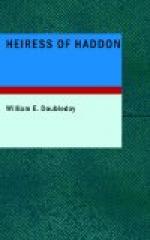Without loss of time the two guests sped on their way at the appointed time, and were amongst the very first of the visitors. Disappointment, however, awaited them. Father Philip was dying. The Derby leech had done his best to restore the injured man, and although he had succeeded in prolonging the patient’s life for a little while, all his efforts to save the unfortunate confessor failed, and seeing the father suddenly begin to sink, he had, the night before John Manners arrived, given up all hope of saving his life, and announced that the end was nigh at hand.
Under these circumstances mounted messengers were at once despatched to inform the invited guests that it had been found necessary to postpone the feast, and asking them to defer their visit until they should hear again from Haddon. This, in almost every other instance, had succeeded in staying the visitors; but Manners and Crowleigh had started at the break of day, and were well on their way before the messenger had found his way to stop them.
A little manoeuvring on Dorothy’s part gained, to Margaret’s qualified delight, an invitation for them to stay from no less a personage than the dying man himself. Father Philip had taken kindly to Crowleigh from the first, and was grateful to him for the skill and patience he had bestowed upon him on his previous visit, and he was ready enough to accede to any request, whatever it might be, that his Dorothy, his beloved Dorothy, thought well to ask.
Not a brother of the cloth could be found to take the father’s place, and this loss proved exceedingly awkward to all at Haddon at this juncture.
The Reformation had come in with so much vigour; the enactments against the Roman Catholics were so stringent, that not even another priest could be found to shrive him. The pendulum of fortune had indeed swung back again with a vengeance. From one extreme the religious laws had gone to the other; and so it befell that the father, to his exceeding great regret, found himself dying with never a minister of his own persuasion near at hand.
Crowleigh again came to his relief. He had a friend, a staunch Catholic who had been expelled from Oxford University soon after Elizabeth’s accession on account of his strong religious views. He had turned monk, and, during the recent pitiless times, it had frequently fallen to Sir Everard’s lot to befriend him. He was at this time in hiding at no great distance from Crowleigh’s estate, and the latter had sufficient confidence in his friend’s willingness to come to promise Sir George Vernon that he would fetch him.
The offer was gladly accepted. Without any delay the two best horses in the stable were saddled, and within a very short space of time both horses and rider were well started on their way towards the south-western boundary of the shire.
Nicholas Bury had for two years lived the life of a hermit. In his seclusion he had become happy, and though the reverence was denied him which the early hermits had accustomed themselves to receive, yet he was at least unmolested, and thanks to Sir Everard, who ever assisted him in time of need, he was never left to want for the few necessaries of life that he required.




